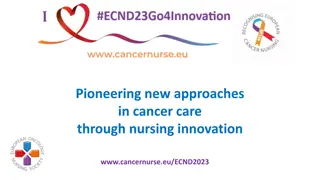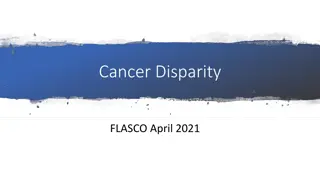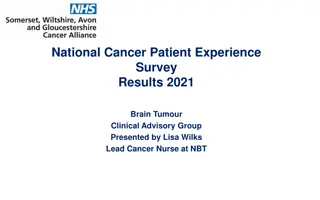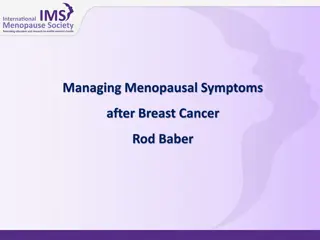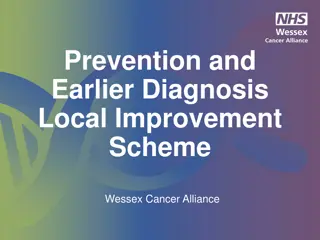Strategies for Implementing Cancer Survivorship Care Plans in Practice
Qualitative Comparative Analysis study aimed to identify effective strategies for successfully implementing Survivorship Care Plans (SCPs) in practice, focusing on key elements such as cancer type summary, treatment recommendations, follow-up guidance, secondary cancer prevention information, and psychosocial resource availability. The study was conducted in the context of the Quality Oncology Practice Initiative (QOPI) with the goal of closing the gap in SCP development and delivery rates. Data was sourced from SCP implementation measures and interviews with employees in varied success QOPI practices to recruit individuals contributing to SCP development and delivery.
Download Presentation

Please find below an Image/Link to download the presentation.
The content on the website is provided AS IS for your information and personal use only. It may not be sold, licensed, or shared on other websites without obtaining consent from the author. Download presentation by click this link. If you encounter any issues during the download, it is possible that the publisher has removed the file from their server.
E N D
Presentation Transcript
GILLINGS SCHOOL OF GLOBAL PUBLIC HEALTH A Qualitative Comparative Analysis Study of Strategies for the Successful Implementation of Cancer Survivorship Care Plans in Practice Sarah Birken, PhD; Sara Jacobs, PhD; Jamiyla Bolton, BA; Alecia S. Clary, MSW; Miriam Tardif-Douglin, BA; Shampa Bernstein, JD; M. Alexis Kirk, MSPH North Carolina Translational & Clinical Sciences Institute Grant # 550KR111503 September 8, 2017 4thBiennial Society for Implementation Research Collaborative 1
Background When life is sewn back together, it has changed
Background Survivorship care plan core elements: 1. Summary of the cancer type, treatment, and potential treatment- related late complications 2. Recommendations for follow-up 3. Information on secondary cancer prevention and health promotion 4. Guidance on protection of employment and insurance coverage 5. Content and local availability of psychosocial resources
Rationale Survivor SCP Cancer care providers Primary care providers Closing the implementation gap requires identifying effective strategies.
Objective To identify strategies for successfully implementing SCPs in practice
Setting Quality Oncology Practice Initiative (QOPI), a national cancer care quality improvement initiative in which SCP development and delivery rates are suboptimal 600+ participating practices
Data sources SCP implementation:QOPI performance data include measures of SCP development and delivery, for quality improvement purposes: Variable Item Response format Yes/no SCP development Was SCP completed within 3 months of adjuvant therapy? Was the SCP provided to survivor? Yes/no Was the SCP communicated to providers continuing care for the survivor? SCP delivery to survivors SCP delivery to follow-up care providers Yes/no 7
Data sources Strategies: Interviews with employees in QOPI practices with varied success in implementing SCPs
Recruitment Goal: Identify individuals in QOPI practices who contributed to SCP development and/or delivery QOPI liaison contacts snowball One-week intervals with up to 11 contacts: Letter Email Telephone calls
Procedure Interview guide based on Theoretical Domains Framework constructs (e.g., belief about consequences of SCP use, resources and leadership for SCP use) identified in preliminary studies as relevant 2 interviewers from RTI trained by PI Telephone 30-60 minutes Audio-recorded Transcribed verbatim
Qualitative comparative analysis Identifies recipes for success Principle of equifinality (recipes aren t one-size-fits all) Explores complex causality within small samples
Template analysis Codebook based on Theoretical Domains Framework constructs Combines a priori and emergent themes Reconciliation of coding two transcripts among the two interviewers and myself NVivo
Transformed data for QCA Case Condition A: Attitudes about SCPs Condition B: Beliefs about consequences of SCPs etc. SCP implementation success Cancer program A 0 0 1 Cancer program B 1 0 1 Cancer program C 0 1 0 etc
Truth table Strategy Successful cancer programs with this strategy Unsuccessful cancer programs with this strategy Output: Solutions Condition A, not B C 0 3 Cond 1*not Cond 2* not Cond 3 + not Cond 1* Cond 2*Cond 3 Conditions A and B, not C 1 2 Conditions A, B and C 2 1 Analysis of truth table Conditions A and C, not B 0 0
Sample SCP implementation Included cancer programs Total interview participants Low SCP development Low delivery to survivor Low delivery to PCP 3 4 High SCP development Low delivery to survivor Low delivery to PCP 2 2 High SCP development Low delivery to survivor High delivery to PCP 7 11 High SCP development High delivery to survivor High delivery to PCP 2 3 TOTAL 14 20
Qualitative Variable Attitudes and consequents High performers Addresses non-clinical aspects of cancer Meet accreditation standards Active leadership Dedicated champion Prepared for requirements Leveraged requirements to improve survivorship care Staff dedicated to SCP use Transition to dedicated survivorship program Low performers Addresses non-clinical aspects of cancer Meet accreditation standards Passive leadership Emerging champion Reacted to requirements Champions and leadership Goal and target setting Staff have many roles Maintain provider from diagnosis through survivorship Human Resources Bold denotes differences between high-and low-performers
Qualitative, cont. Variable Informational Resources High performers Query the EHR/cancer registry for eligible patients Order alert Low performers Maintain an excel spreadsheet of eligible patients Can t track patients who receive treatment elsewhere Rely on word of mouth Relies on the clinical team No standardization across the system SCP team minimizes interference with the clinical team Everyone is on board with the process One person coordinates SCP delivery across the network but others deliver it Social support and teamwork Bold denotes differences between high-and low-performers
Qualitative Comparative Analysis Outcome Recipe Raw coverage* Unique coverage Coverage overlap Strategies for successful SCP implementation: Development Sufficient staffing * positive staff attitudes about SCPs .57 (moderate) .29 (low) Overlaps substantially with other recipes that lead to effective SCP development Delivery to survivors None n/a n/a n/a Delivery to PCP Sufficient staffing * sufficient informational resources .78 (high) 1 (only recipe for outcome) None Underline denotes necessary but insufficient conditions. *Proportion of practices that used strategy to achieve the outcome
Discussion Strategies for successful SCP implementation: the right attitudes and resources to get the job done. Future research is needed to Bear out the identified strategies Understand how high-performers created conditions that facilitated SCP implementation.
Implications for implementation research QCA is a promising method of identifying equifinal combinations of conditions that represent effective implementation strategies
Comparing qualitative and QCA Qualitative QCA Nuanced understanding of relationships Gives relative weight of determinants on outcome, magnitude of comprehensive influence of determinants Requires defined categories Fluid conceptualization of variables
Translational implications: the upshot When you have Choose When you want Choose Fluidly defined variables Qualitative Clear attribution of independent variables influence on outcomes QCA Invalid QCA?? QCA insuffi- cient without qual? Well-defined variables QCA To understand nuances of relationships Qualitative
Acknowledgements Leila Kahwati, Senior Advisor, RTI International Deborah Mayer, Senior Advisor, UNC-CH
References Birken SA, Deal AM, Mayer DK, Weiner BJ. Determinants of survivorship care plan use in US cancer programs. J Cancer Educ. 2014a;29(4):720-727. doi:10.1007/s12187-014-0645-7. Birken SA, Deal AM, Mayer DK, Weiner BJ. Following through: The consistency of survivorship care plan use in United States cancer programs. J Cancer Educ. 2014b;29(4):689-697. doi:10.1007/s13187-014-0628-8. Birken SA, Mayer DK, Weiner BJ. Survivorship care plans: Prevalence and barriers to use. J Cancer Educ. 2013;28(2):290-296. doi:10.1007/s12187-013-0469-x. Birken SA, Presseau J, Ellis SD, Gerstel AA, Mayer DK. Potential determinants of health-care professionals use of survivorship care plans: a qualitative study using the theoretical domains framework. Imp Sci. 2014c;9:167. doi:10.1186/s13012- 014-0167-z. King N, Symon G (ed.), Cassel C (ed.). Qualitative Methods and Analysis in Organizational Research: A Practical Guide. 12th ed. Thousand Oaks, CA: Sage Publications, Ltd.; 1998:118-134. Michie S, Johnston M, Abraham C, et al. Making psychological theory useful for implementing evidence based practice: a consensus approach. Qual Saf Health Care. 2005;14(1):26-33. doi:10.1136/qshc.2004.011155. Salz T, Oeffinger KC, McCabe MS, Layne TM, Bach PB. Survivorship care plans in research and practice. CA Cancer J Clin. 2012;62(2):101-117. doi:10.3322/caac.20142. Tevaarwerk AJ, Hocking WG, Zeal JL, et al. Accuracy and thoroughness of treatment summaries provided as part of survivorship care plans prepared by two cancer centers. J Oncol. Pract. 2017;JOP.2016.018648. doi:10.1200/JOP.2016.018648.




